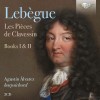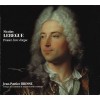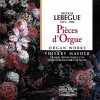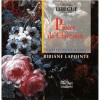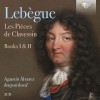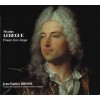传记
Nicolas Lebègue (Le Bègue) (ca. 1631 – 6 July 1702) was a French Baroque composer, organist and harpsichordist. He was born in Laon and in the 1650s settled in Paris, quickly establishing himself as one of the best organists of the country. He lived and worked in Paris until his death, but frequently made trips to other cities to consult on organ building and maintenance matters. Lebègue's reputation today rests on his keyboard music. He made particularly important contributions to the development of the French organ school by devising pieces with independent pedal parts and developing the Tierce en taille genre. His oeuvre also includes the earliest published unmeasured preludes, as well as some of the earliest known noëls.
ebègue was born in Laon, and nothing certain is known about his early years or training. It may be possible that his uncle (also named Nicolas Lebègue), a maître joueur d'instrument, played some role in Lebègue's music education. Equally little is known about the circumstances of Lebègue's move to Paris: the first reference to Lebègue is found in a 1661 document, in which the composer is already described as "the famous Parisian organist", so by then he must have lived and worked in the city long enough to secure a solid reputation. Although this must mean he held at least one organist's position in Paris, where he worked is unknown. The only post he is known to have held is at the Church of Saint-Merri, where he worked since from 18 December 1664 until his death. Lebègue started publishing his music in 1676, and in 1678 was selected to become one of the organistes du Roi ("organist to the King"), a prestigious position he shared with Guillaume-Gabriel Nivers, Jacques-Denis Thomelin, and Jean-Baptiste Buterne.[1]
The surviving copies of Lebègue's music are very numerous, and this indicates that he was a very highly acclaimed musician. He was equally famous as an expert on organ building: in this capacity, Lebègue travelled as far as Bourges, Blois, Chartres, Soissons, and Troyes. Finally, Lebègue was also an influential teacher: his pupils include François d'Agincourt, Nicolas de Grigny, and probably many lesser figures such as Gabriel Garnier, Jean-Nicolas Geoffroy, and Gilles Jullien.[1] It was also through Lebègue that Pierre Dumage received his first important position, at the Saint-Quentin collegiate church.







